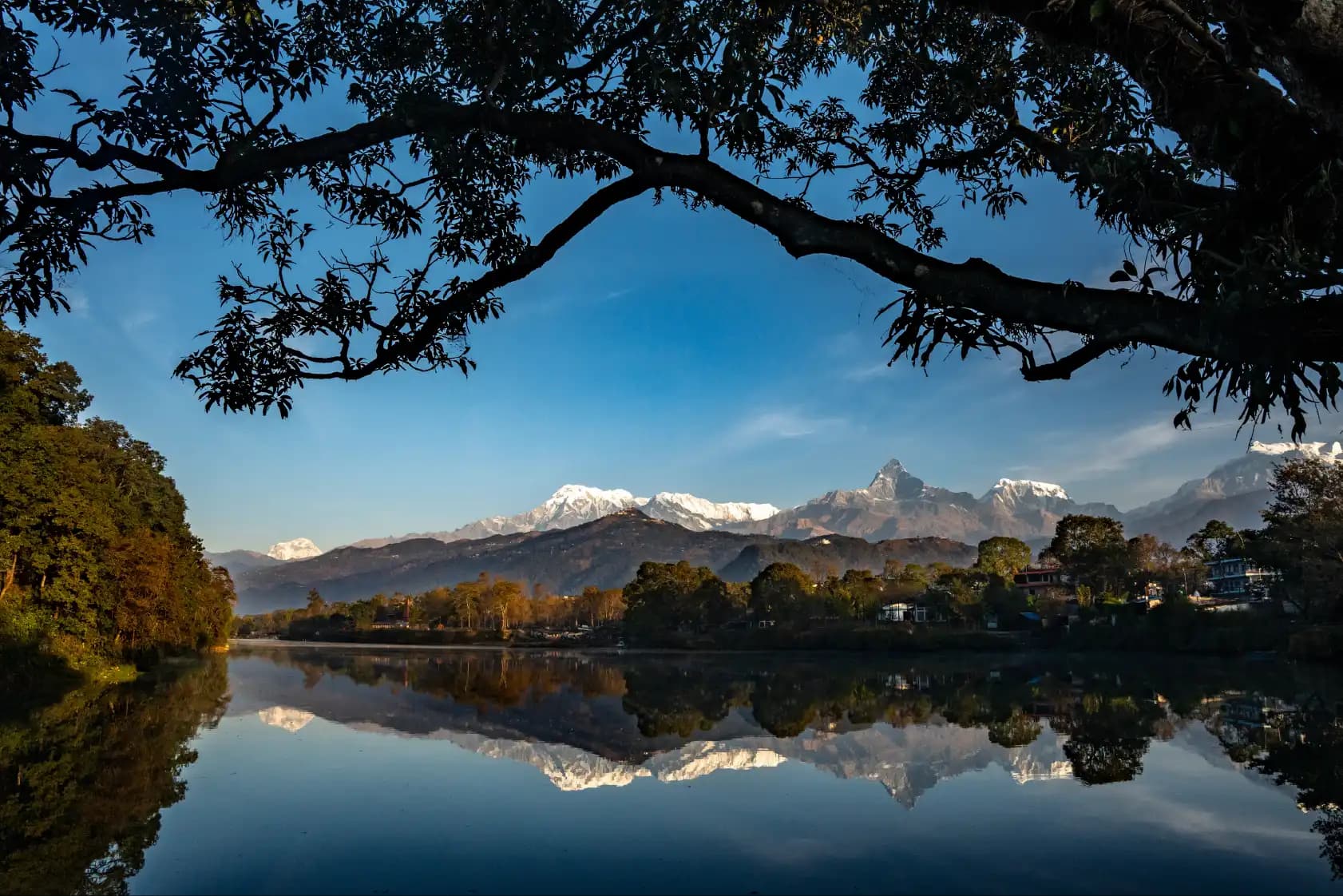

5 Nights 6 Days
We Offer Group Discount
Oct 12 - Oct 18, 2025
Oct 12 - Oct 18, 2025
Oct 12 - Dec 18, 2025
Oct 12 - Oct 18, 2025
Annapurna Region
Hotel and Teahouse
Forest and Mountain Trail
All Year
Moderate
5 Nights 6 Days
6-7 hours
73.7 km
The 6-Day Pokhara Trail Running is a scenic Nepal trail running adventure through the Annapurna foothills of Pokhara, covering 12–25 km daily across forests, villages, and hot springs. Reaching 3,210m at Ghorepani-Poon Hill, it offers stunning views of Annapurna, Dhaulagiri, and Machhapuchhre with an easy-to-moderate difficulty level.
Day | Route | Distance | Duration | Altitude | Elevation Change |
| 1 | Hemja to Pitam Deurali | 15 km | 3-4 hours | 2,100m | +933m gain |
| 2 | Pitam Deurali to Landruk | 11.5 km | 3 hours | 1,565m | -535m loss |
| 3 | Landruk to Bhadaure | 18 km | 5 hours | 1,400m | -165m loss |
| 4 | Bhadaure to Panchase | 8 km | 2-2.5 hours | 2,500m | +1,100m gain |
| 5 | Panchase to Jhuma Danda | 10 km | 3 hours | 1,580m | -920m loss |
| 6 | Jhuma Danda to Pokhara | 11.2 km | 3 hours | 822m | -758m loss |
The package includes ACAP and TIMS permits, guides, porters, meals, and tea house stays. Ideal for runners seeking cultural immersion and Himalayan landscapes, it blends fitness, endurance, and authentic Pokhara trail running experiences.
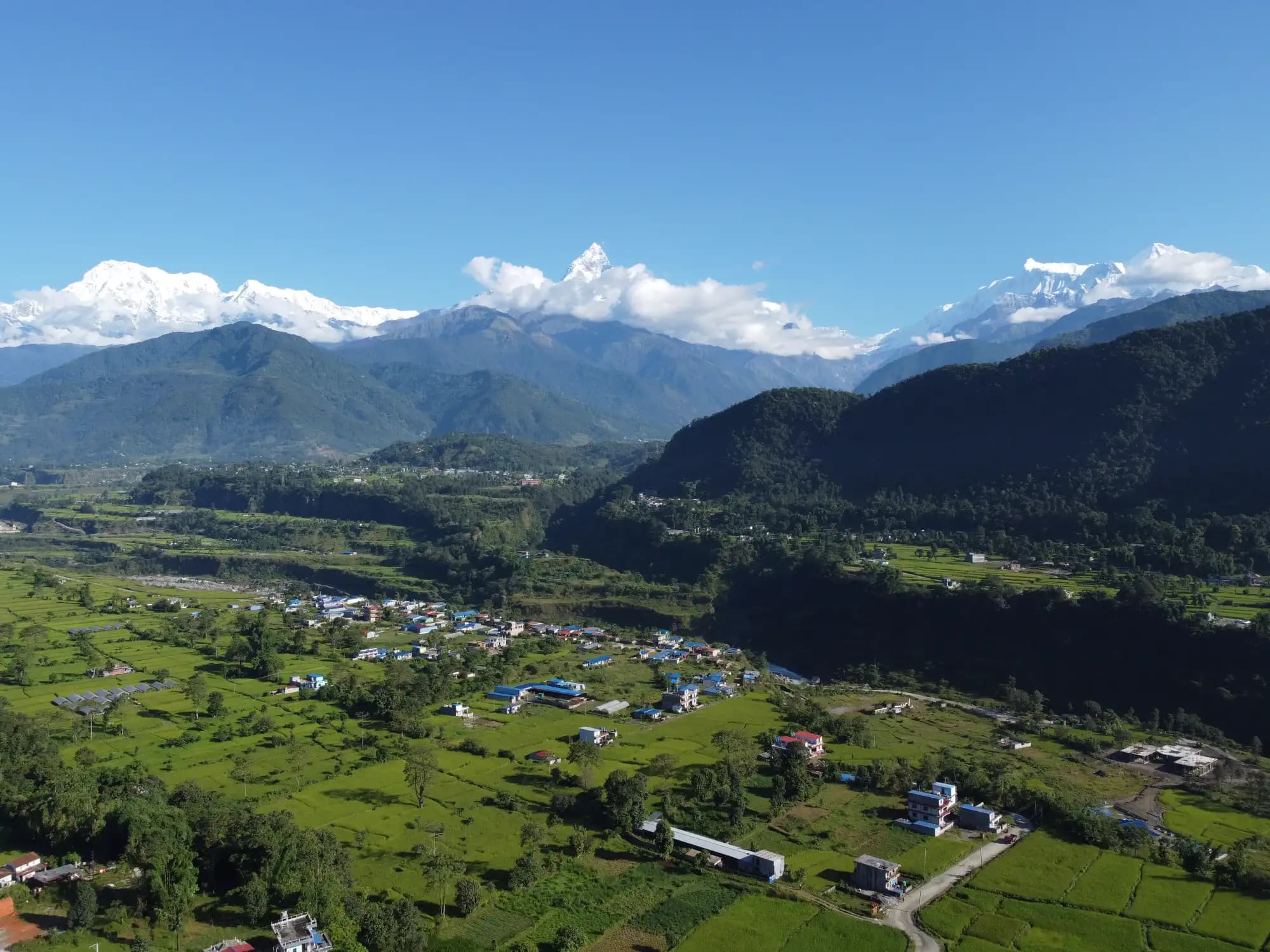
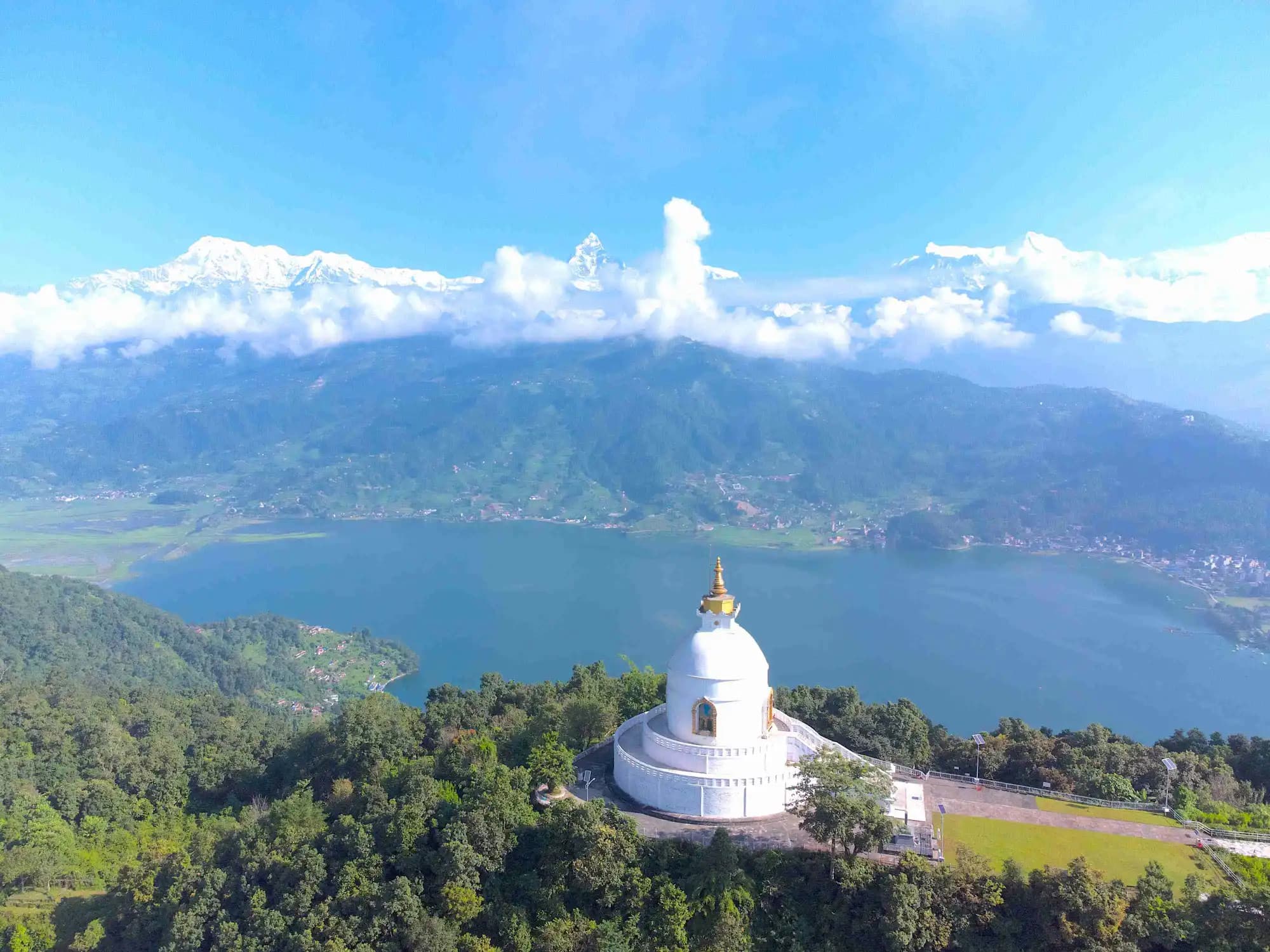
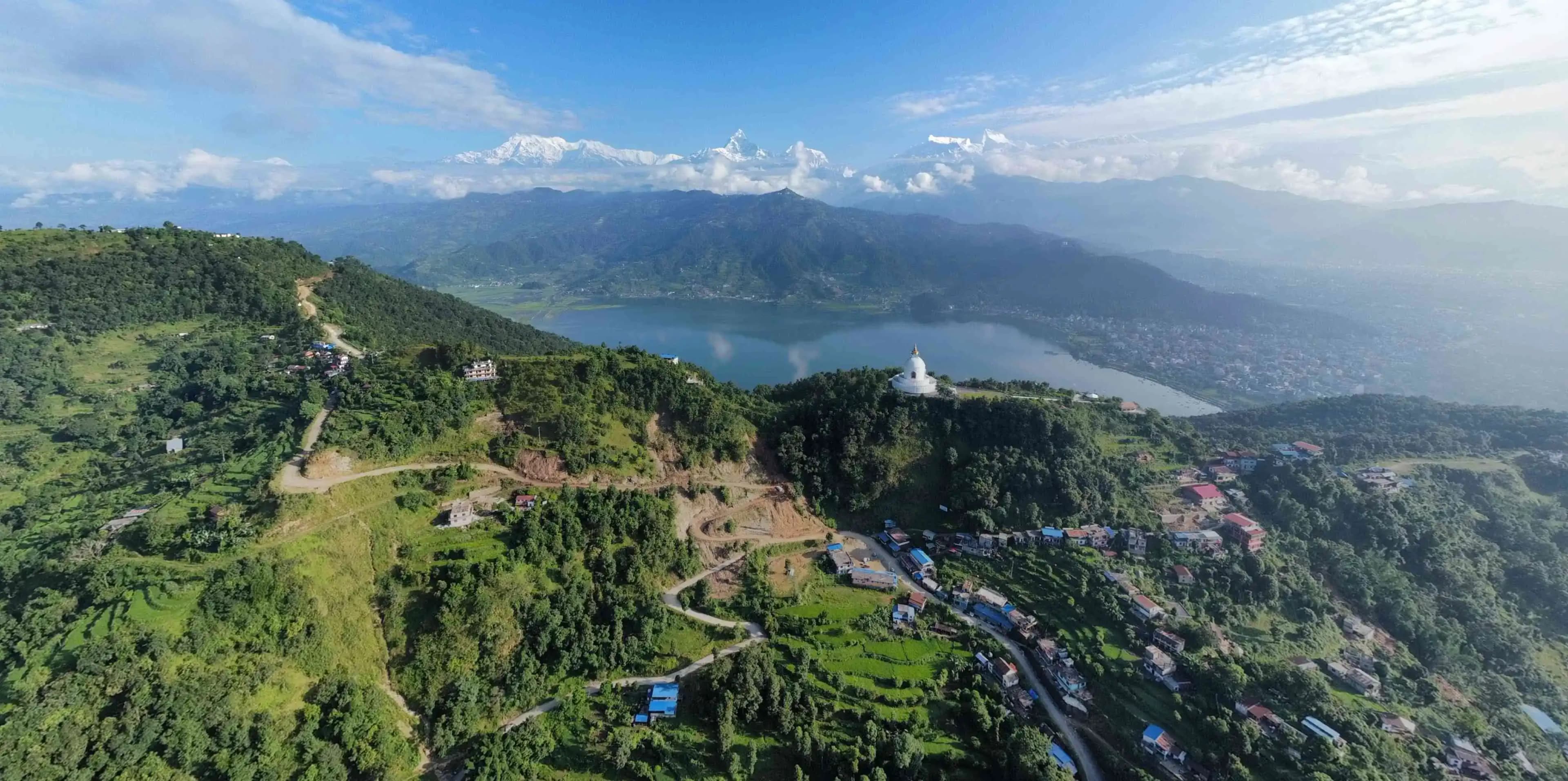
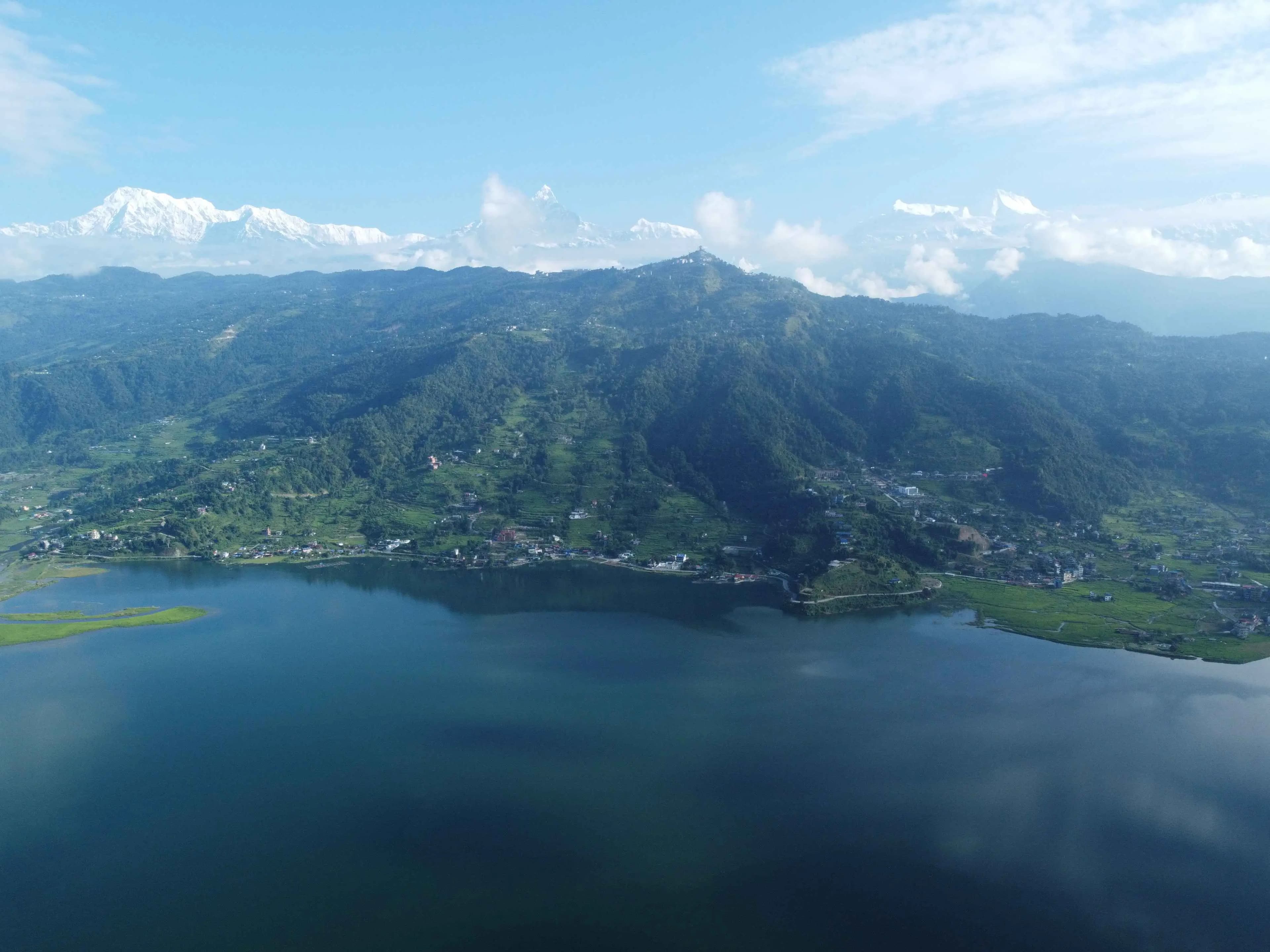
The 6 Days Pokhara Trail Running Adventure Package delivers an exceptional Himalayan trail challenge through diverse terrains surrounding the Pokhara valley. This Pokhara trail running experience combines breathtaking mountain views with traditional cultural immersion across carefully selected villages. Trail runners encounter Annapurna South (7,219m) and Machhapuchhre (6,993m) vistas while navigating mixed terrain from the Hemja starting point to the Pokhara finish. The program covers Pitam Deurali, Landruk, Bhadaure, Panchase, and Jhuma Danda with daily distances ranging from 12-25 kilometers.
This trail running Nepal adventure features easy to moderate difficulty levels suitable for runners with basic hiking experience. Maximum altitude reaches 2,500m at Panchase viewpoint, minimizing high altitude concerns while maximizing scenic rewards. Tea houses and lodge accommodation provide comfortable mountain hospitality throughout the journey. Daily running duration spans 4-5 hours across paved roads, unpaved trails, and muddy surfaces, testing various technical skills. The Annapurna region showcases rich Gurung culture, traditional honey hunting practices, and pristine forest environments.
All necessary permits, including ACAP and TIMS documentation, are included with professional guide services and porter support. This outdoor running challenge incorporates suspension bridge crossings, local community interactions, and traditional dal bhat meals. The program requires booking with minimum participant requirements and full refund policies for cancellations. Weather-appropriate gear recommendations and personalized training advice ensure optimal preparation for this memorable Himalayan race series experience.
This forest and mountain trail has a moderate difficulty rating. Proper preparation and fitness are essential.
Best season for this adventure is All Year . Weather conditions can change rapidly in the mountains.
We'll conduct a pre-trip briefing to discuss the Pokhara Trail Running - 6 Days route, safety guidelines, equipment requirements, and what to expect during your 5 Nights 6 Days adventure.
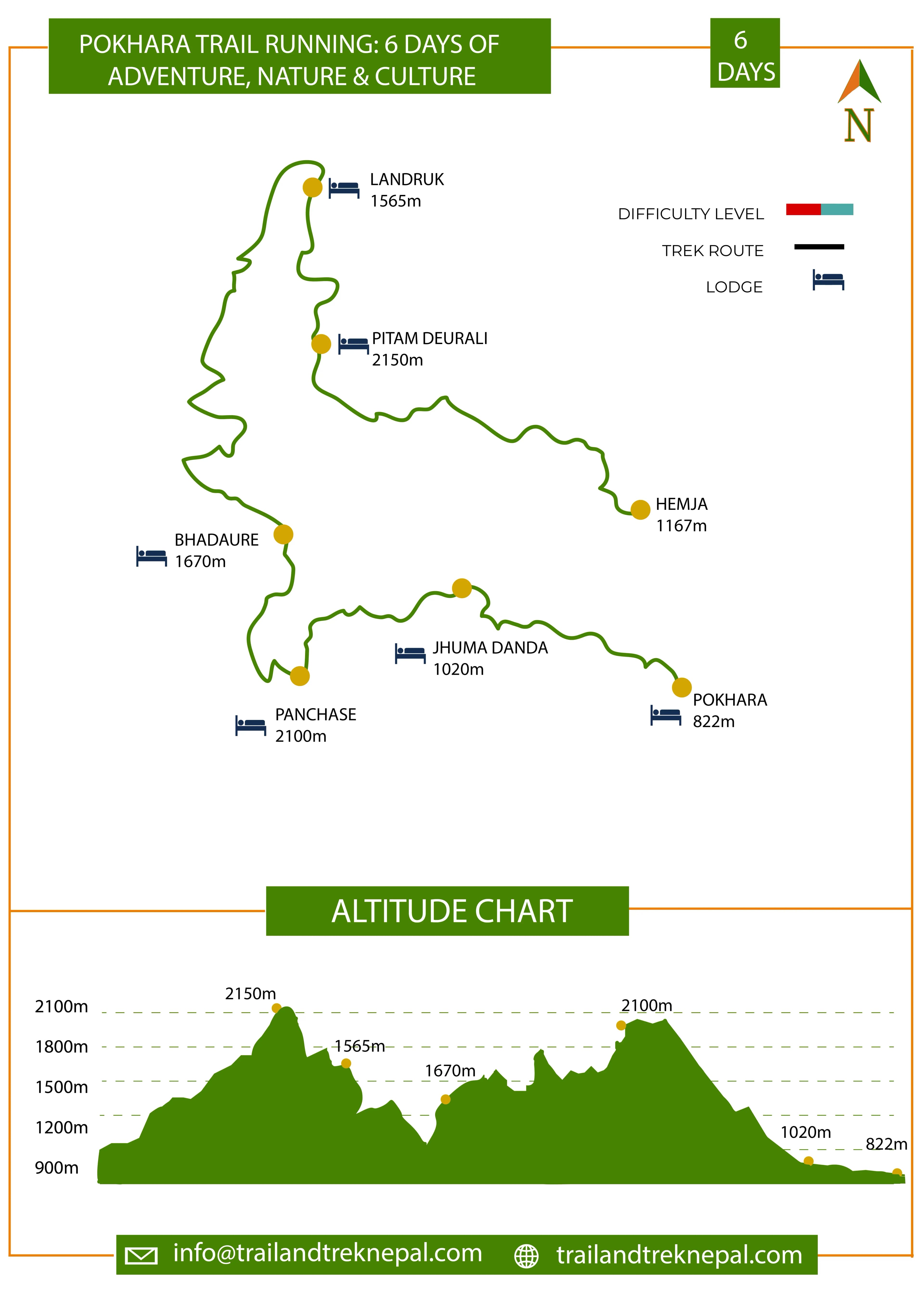
Any other food/drink should be covered by you, except (3 meals) provided by the company.
Personal equipment
Tips for the Guide and Potter
Additionally, cost due to any unforeseen circumstances, i.e, illness, bad weather, natural calamities, etc.
Any expenses that are not in the included section.
The main concept of fastpacking is to carry lighter bag will help you travel further distance in lesser time. Fastpacking gears helps trekkers to run and walk cover multiple days. By fitting all necessary supplies into a lightweight backpack, you can travel faster and cover greater distances, enabling you to explore more without needing to return to a fixed base each night.
Fitness Assessment and Training Design: Individual fitness evaluation determining current capabilities and improvement areas. Customized training program development addressing specific needs and timeline constraints. Technique instruction covering proper running form, pacing strategies, and equipment usage. Progress monitoring, ensuring adequate preparation, and injury prevention.
Equipment Selection and Testing: Gear consultation addressing individual needs, preferences, and budget considerations. Equipment testing opportunities ensure proper fit and performance before program participation. Packing strategy instruction maximizing efficiency while minimizing weight burden. Maintenance and repair instructions for extended outdoor equipment usage.
Paved Road Sections: Smooth, hard surfaces enable efficient speed development and distance coverage. These segments provide excellent traction and reduced technical difficulty. Village approaches and urban connections predominantly feature paved conditions. Trail runners experience optimal pace development and cardiovascular rhythm maintenance.
Unpaved Trail Networks: Mountain paths include dirt, gravel, and rocky surfaces throughout the route. Technical terrain requires careful foot placement and balance management. Forest sections and remote areas feature predominantly unpaved conditions. These surfaces test equipment durability and technical running skill development.
Muddy Surface Challenges: Monsoon season and natural water sources create slippery, challenging conditions. Careful navigation prevents accidents while maintaining steady progression. Specialized footwear provides essential grip and ankle support capabilities. Weather conditions significantly impact muddy trail difficulty and safety considerations.
The trail combines easy, moderate, and challenging segments requiring varied skill levels. Overall difficulty rating remains accessible for runners with basic hiking experience. No extreme technical climbing skills are necessary for program completion. Gradual elevation changes accommodate progressive fitness development throughout the journey.
Easy Segments: Flat terrain with stable surface conditions and minimal elevation changes. Village areas and valley floors typically provide easy running conditions. Urban approaches and cultural site visits require minimal technical skills.
Moderate Segments: Gradual elevation changes with mixed surface conditions requiring attention. Forest trails and traditional village approaches present moderate challenges. Steady pace maintenance is possible with basic trail running experience.
Challenging Segments: Steep uphill climbs and technical downhill sections test physical fitness. Rocky terrain and muddy conditions require advanced navigation skills. Weather-dependent difficulty variations demand flexible preparation strategies.
The Pokhara foothills trail race utilizes well-established tea house accommodation throughout the route. Traditional mountain lodges provide basic but comfortable facilities with authentic hospitality. Shared bathroom facilities and common dining areas characterize most locations. Local family operations offer genuine cultural exchange opportunities with traditional lifestyle observations.
Facility Standards: Basic bedding, blankets, and pillows included with accommodation services. Hot water availability varies by location, with additional charges a common practice. Electronic device charging is possible with variable reliability depending on the location. Wi-fi connectivity is limited in remote areas, requiring realistic communication expectations.
Three daily meals are provided, covering breakfast, lunch, and dinner nutritional requirements. Traditional dal bhat provides essential carbohydrates and protein for endurance activities. Tea and coffee are served twice daily, maintaining hydration and warmth throughout challenging conditions. Fresh and dry fruits supplement nutrition, supporting physical performance and recovery needs.
Cultural Cuisine Experience:
Village visits provide an authentic cultural exchange with traditional Gurung communities. Local guide interpretation facilitates meaningful communication and cultural understanding. Traditional craft demonstrations showcase ancestral skills and contemporary applications. Agricultural practice observations reveal mountain farming techniques and seasonal adaptations.
Cultural Learning Opportunities:
This mountain endurance race demands solid cardiovascular fitness and basic trail running experience. Previous hiking experience is beneficial but not mandatory for program participation. Regular running practice is essential for daily distance and duration requirements. An overall health assessment is recommended before committing to mountain adventure activities.
Training Timeline: Several weeks to months of preparation recommended for optimal performance and safety. A Consistent training schedule prevents injury while building necessary endurance capabilities. 2-3 weekly training sessions minimum requirement for adequate preparation. Progressive difficulty increases to accommodate current fitness levels and improvement goals.
Specific Training Elements:
Professional training advice available based on individual fitness assessment and program selection. Customized preparation plans accommodate current abilities and improvement timelines. Technique instruction covers proper form, pacing strategies, and equipment utilization. Mental preparation guidance addresses challenge management and motivation maintenance throughout the program.
Training Focus Areas:
Technical Clothing: Moisture-wicking shorts and t-shirts prevent chafing during extended activity. Quick-dry materials are essential for daily washing and rapid drying capabilities. Multiple sets are required, accommodating a 6-day program without extensive washing facilities. The layering system addresses temperature variations from valley heat to mountain coolness.
Specialized Footwear: Trail running boots with aggressive tread patterns are mandatory for mixed terrain. Ankle support prevents injury on uneven surfaces and technical descents. Waterproof or water-resistant features protect against stream crossings and wet conditions. Comfortable fit essential for extended daily wear and varied terrain challenges.
Pack System: Lightweight daypack for essential items, including water bottles, snacks, and emergency supplies. Comfortable shoulder straps and back ventilation prevent fatigue during long running days. Easy access pockets facilitate frequent item retrieval without pack removal. Hydration system compatibility supports optimal fluid intake maintenance.
A professional trekking guide carries comprehensive safety and emergency equipment. First aid medical kit includes an oximeter for altitude monitoring and assessment. Emergency communication devices ensure rescue coordination if circumstances require assistance. Porter services handle group cooking equipment and shared safety supplies.
Annapurna Conservation Area Project (ACAP) Permit: Required for all participants at $25 per person cost. Environmental conservation fee supporting trail maintenance and habitat protection. Valid throughout the Annapurna region, including all planned route destinations. Contributes to local community development and conservation program funding.
Trekkers Information Management System (TIMS) Card: Essential safety tracking documentation for emergency coordination. Emergency contact information and insurance details registration. Facilitates rescue operations and safety monitoring throughout the program. Required for all organized trekking activities within Nepal's regulated areas.
All permit paperwork is handled by an organizing company with professional processing service. Participants provide passport copies and recent photographs for permit applications. Processing requires 1-2 days' advance notice, ensuring proper documentation completion. Emergency permits are available with additional fees for last-minute program participation.
Required Personal Documents:
The maximum altitude of 2,500m poses minimal altitude sickness risk for most participants. A gradual ascent profile reduces altitude-related complications through proper acclimatization. Immediate descent protocols are available if altitude symptoms develop unexpectedly. Professional guide training includes altitude sickness recognition and emergency response procedures.
Altitude Monitoring Procedures:
Mountain weather conditions change rapidly, requiring constant monitoring and preparedness. Seasonal variations affect trail difficulty, safety margins, and equipment requirements. Emergency shelter and weather protection equipment are carried by professional guides. Weather-related itinerary modifications prioritize participant safety over schedule adherence.
Emergency Response Systems:
Professional mountain guides possess extensive experience in Himalayan trail running and safety management. First aid certification and emergency response training ensure appropriate medical assistance. Local area expertise includes weather patterns, trail conditions, and cultural knowledge. English language proficiency facilitates clear communication and safety instruction.
Guide Responsibilities: Route navigation and safety monitoring throughout the entire program duration. Cultural interpretation facilitates meaningful community interactions and learning opportunities. Emergency response coordination, including first aid provision and evacuation procedures. Weather assessment and program modification decisions prioritizing participant safety and experience quality.
Local Expertise: Comprehensive knowledge of regional weather patterns, trail conditions, and seasonal variations. Cultural background enabling authentic community connections and traditional practice explanations. Language skills facilitate communication with local communities and service providers. Emergency resource identification, including evacuation routes and medical facility access.
Porter services are provided at one porter per two participants, ensuring adequate gear transport. The maximum carrying capacity is 15-22 kg per porter, following ethical employment standards. Group equipment transport, including safety gear, cooking supplies, and emergency equipment. Personal gear carrying is available with additional cost arrangements and advance planning.
Ethical Employment Standards:
Professional Guide Services: Highly experienced mountain guide with safety training and cultural expertise. Complete guide support, including food, accommodation, equipment, and accident insurance coverage. Salary and equipment costs are ensuring professional service delivery throughout the program. Cultural interpretation and safety management add significant value to the overall experience.
Complete Meal Package: Three nutritious meals daily, including breakfast, lunch, and dinner, with local and international options. Tea and coffee service twice daily, providing warmth and hydration support. Fresh and dry fruits supplement nutrition and energy requirements during physical activities. Traditional dal bhat meals offer authentic cultural culinary experiences.
Essential Support Services: All permit processing and documentation handling, eliminating participant administrative burden. Porter services for group equipment transport, reducing individual carrying requirements. First aid medical kit with an oximeter for health monitoring and emergency response. Trek completion certificate recognizing achievement and providing lasting program memorabilia.
Flexible Transportation Options:
Personal Expenses: Individual equipment and specialized gear not included in package pricing. Extra food and beverages beyond the included meal packages are available at tea houses. Personal shopping and souvenir purchases in villages and cultural sites. Customary tips for guides and porters reflecting service quality and cultural practices.
Contingency Costs: Emergency evacuation insurance is recommended, covering unforeseen medical situations. Weather-related program extensions due to flight delays or trail conditions. Personal medical expenses and prescription medications are not covered by the basic first aid kit. Program modifications due to individual health concerns or fitness limitations.
Spring Season (March-May): Clear mountain views with minimal cloud cover provide excellent photography conditions. Rhododendron blooms create spectacular natural displays throughout forest sections. Moderate temperatures are suitable for extended daily running activities. Stable weather patterns reduce program disruption risks and safety concerns.
Autumn Season (September-November): Crystal clear mountain visibility with dry trail conditions optimizing running surface quality. Perfect temperature ranges for high-altitude activities without extreme heat or cold. Stable atmospheric conditions with minimal precipitation affecting trail safety. Peak tourism season requiring booking for accommodation and services.
Monsoon Season (June-August): Heavy rainfall creates muddy and potentially dangerous trail conditions. Reduced mountain visibility, limiting scenic photography and viewpoint experiences. Increased landslide risk along certain trail sections requires route modifications. Not recommended for inexperienced trail runners due to technical difficulty.
Winter Season (December-February): Cold temperatures at higher elevations require additional clothing and equipment. Limited tea house operations in some remote areas are affecting accommodation options. Clear mountain views, but challenging conditions demanding winter experience and preparation. Suitable for experienced mountain runners with cold-weather expertise.
Daily temperature variations from warm valley conditions to cool mountain elevations. Rapid weather changes require flexible clothing systems and emergency preparation. Rain protection is essential regardless of season due to unpredictable mountain precipitation. Sun protection is crucial at elevation with intense UV exposure and reflection.
Trail operations within protected conservation areas require strict environmental compliance. Leave no trace principles are mandatory for all participants and support staff. Wildlife habitat protection, including rare species observation without disturbance. Water source conservation prevents contamination and supports ecosystem health.
Conservation Guidelines
Local community employment ensures tourism benefits reach traditional mountain villages. Traditional accommodation supports sustaining family businesses and cultural practices. Local product sourcing, when possible, supports regional agriculture and crafts. Conservation education promoting environmental awareness among international visitors.
Community Benefits
Fitness Assessment and Training Design: Individual fitness evaluation, determining current capabilities and improvement areas. Customized training program development addressing specific needs and timeline constraints. Technique instruction covering proper running form, pacing strategies, and equipment usage. Progress monitoring, ensuring adequate preparation, and injury prevention.
Equipment Selection and Testing: Gear consultation addressing individual needs, preferences, and budget considerations. Equipment testing opportunities ensure proper fit and performance before program participation. Packing strategy instruction maximizing efficiency while minimizing weight burden. Maintenance and repair instructions for extended outdoor equipment usage.
Advanced Trail Running Programs: More challenging itineraries, building upon skills and confidence developed during the 6-day experience. Higher altitude programs, including high altitude training and technical terrain challenges. Extended duration programs covering greater distances and more remote areas. Competitive preparation programs focusing on racing technique and performance optimization.
Cultural Immersion Extensions: Extended village stays provide deeper cultural understanding and language learning opportunities. Traditional craft learning, including weaving, cooking, and agricultural practices. Festival participation, when seasonal timing permits authentic celebration experience. Volunteer opportunities supporting community development and conservation projects.
Pokhara Trail Running - 6 Days is available for booking on the dates below. Please inquire for the best deal or share with friends to plan together. All trips are group based. For custom trips, contact us.